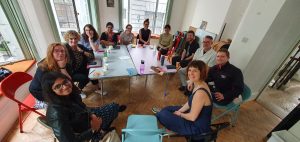Post-event reflection: “Transformation and Collectivity in the Archive”, Mayday Rooms 2022
Documenting Performance Working Group

The Documenting Performance Working Group at Mayday Rooms, 18 May 2022
On 18 May 2022 a group of interdisciplinary performance scholars based in the UK gathered for the Documenting Performance field trip, “Transformation and Collectivity in the Archive”. Designed as an event for exploratory research and collective thinking, the activities centred on cultural and political materials found at
Mayday Rooms, an “archive, resource and safe haven for social movements, experimental and marginal cultures and their histories” based in central London.
Following an introduction to the space by Mayday Rooms staff collective members, the Documenting Performance Working Group co-convenors Harriet Curtis, Diana Damian Martin, and Eleanor Roberts posed a series of key questions to participants. With a focus on encountering performance in and with the archive, and processes of collective transformation that take place through engaging with the performance document, these served to help frame discussion points which emerged throughout the day.
During the morning, invited guest speakers Istanbul Queer Art Collective (comprised of the artists Tuna Erdem and Seda Ergul) presented documentation and reflections on their work
Moebius Stripping (2019). This performance centred on the artists cutting into pieces documentation submitted to the Home Office to “
extend their ‘leave to remain’ in the UK“, creating a performance and display of destroyed and transformed immigration paperwork. In discussion with the artists, this enabled the elaboration of intersections of the archive, performance, and power, which participants returned to in multiple ways through event discussions.
Participants were then invited to explore
Mayday Rooms’ collections, which resulted in individual and collective engagement with key materials, including those representing specific cultural and political movements of housing, labour, women’s and Black struggles in the US and UK, and radical performance histories Scratch Orchestra and Queeruption. With the freedom to move between collections in an exploratory way, participants were able to encounter unfamiliar and potentially unexpected performance histories from the 1960s to the present.
In a final plenary discussion, participants reflected on not only the specific histories and materials themselves, but also the methods, processes, politics, and affective dimensions of conducting archival performance research. This included ideas of “official” and “unofficial” histories, how archives produce and enable cultural access and legitimation, and the positions of distance and privilege occupied by the archival researcher. The day closed with collective reflections on how we “do” performance research in and with archives, and the protocols and cultural norms that inform how archives are organised. Particularly, participants commented on the benefits of engaging with an archive which works very differently than major institutional sites and repositories, with a strong ethos of DIY engagement and accessibility.
Some take-aways:
“Honestly, it was one of the best TaPRA events I have ever been to. I came away so nourished and grateful. The very idea of setting up an away day in a radical archive – as opposed to a seminar room – and then facilitating an exploration followed by food (so good) and a conversation, instead of the traditional mode of conference papers, felt very inclusive and generative. I also loved how institutional hierarchies appeared (to me) to be dismantled in this collaborative way of doing and thinking, and really appreciated hearing from the Istanbul Queer Art Collective, too.”
“That the archive is a really interesting and brilliant space and that so much of my own thinking and research is furthered by collaborative actions – like rummaging through a box with someone else!”
“It was a fantastic day and wonderful to be back in a room again with other researchers. I particularly valued the provocation from IQAC, which got us off to a strong start and really clarified the potential of group engagement with the archive.”
“An expanded approach to the concept of the archive; previously untested methodologies of archival research; a more communal, generous engagement with archived materials.”
– participant feedback, “Collectivity and Transformation in the Archive”, Mayday Rooms 2022
“Transformation and Collectivity in the Archive” was organised by the Documenting Performance Working Group convenors: Harriet Curtis, Diana Damian Martin, and Eleanor Roberts